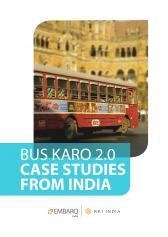
Priyanka Vasudevan, Pawan Mulukutla, Amit Bhatt, Arnab Roy, Ashwin Prabhu, Binoy Mascarenhas, Manish Pandey, Nikhil Chaudhary, Prashanth Kumar Bachu, Srikanth Shastry, Umang Jain, Vijay Anadkat
EMBARQ India’s latest publication, Bus Karo 2.0 – Case Studies from India seeks to understand and document the implementation of significant advancements in bus transport in India. A variety of case studies have been examined, and the different aspects of implementation investigated in order to assess the success of a project. The purpose of this publication is to complement the Government of India’s current initiatives and to strengthen bus-based public transport in the country.
Through EMBARQ India’s work in various Indian cities, a need was realised for a common platform for sharing of best practices, experiences and challenges in order to encourage and replicate innovation across the field. Bus Karo 2.0 is an effort in this direction. It provides an overview of the current state of affairs regarding the urban public transport system in India, highlighting the phenomenal growth in numbers and the implementation of new advancements in technology, service financing methods and management techniques.
The publication takes a close look at key areas like planning and operations, support infrastructure, fuel efficiency training and management, technology applications, branding and marketing, and financing models.
If you have any questions or comments, or would like to know more about the research, contact Pawan Mulukutla at pawan.mulukutla@wri.org or Priyanka Vasudevan at priyanka.vasudevan@wri.org
